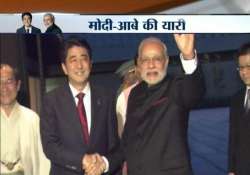Modi, Abe meet over dinner, pitch for robust future in ties
Kyoto: Setting the tone for their formal Summit on Monday, Prime Minister Narendra Modi and his Japanese counterpart Shinzo Abe tonight spoke about a “strong and robust future” for the bilateral ties, with the Indian

Kyoto: Setting the tone for their formal Summit on Monday, Prime Minister Narendra Modi and his Japanese counterpart Shinzo Abe tonight spoke about a “strong and robust future” for the bilateral ties, with the Indian leader hoping that the two sides would strive to achieve in five years the unrealised potential of five decades.
Meeting over a dinner hosted here by Abe in honour of Modi in the elegant setting of the Imperial Guest House, the two leaders underlined the importance India and Japan have for each other.
“The discussions covered economic issues, and the opportunities that both countries had,” a PMO statement said.
They talked about the need to seize the opportunities presented by their respective strong political mandates to inject new momentum and energy in their economies.
“They spoke with great optimism about a strong and robust future for India-Japan economic partnership,” it said.
Modi observed that the relationship was far below potential and expressed hope that the two sides would strive to achieve in five years the unrealised potential of five decades.
Abe spoke with great enthusiasm and strong conviction about India and the importance of India-Japan relations for his country and the region.
Modi described Japan as one of India's closest and most important partners and spoke about his own admiration and affinity for Japan and his high hopes from the relationship.
During the one-and-a-half-hour warm and friendly conversation over a traditional Japanese meal, Modi and Abe spoke with great optimism about “a strong and robust future” for India-Japan economic partnership.
Modi observed that the relationship was far below potential and expressed hope that the two sides would strive to achieve in five years the unrealised potential of five decades.
He said a strong India-Japan partnership was important not just for the economic benefits to the two countries, but even more as a force of good for the region and the world.
Abe expressed confidence that under Modi, India's economic transformation would gather strong momentum.
An economically resurgent India would, he said, be of great strategic importance to the region and the world, and an inspiration for democratic forces around the world.
The two leaders also had an extensive and candid exchange of views on the developments in the region and the world and saw in their remarkable convergence of views a great opportunity to work together for peace, stability and prosperity in Asia and the world.
Modi was deeply touched by Abe's gesture of hosting him in Kyoto. They looked forward to continuing their conversation in Tokyo.
Their discussion was marked by a great deal of mutual respect and admiration and convergence of views, the PMO statement said.
The two Prime Ministers spoke about the ancient cultural and religious links between the countries, which were not known widely.
They felt that the commencement of Modi's visit in Kyoto, the old capital city and an important centre of Buddhism, highlighted the important spiritual foundations of India-Japan relations.
They both keenly looked forward to visiting the ancient Toji Temple, which was a symbol of this link, tomorrow morning.
The MoU between Varanasi and Kyoto, signed earlier in the evening in their presence, was yet another reflection of working together to foster cooperation to address contemporary challenges on the strength of their shared heritage.
Modi also mentioned his plan to visit Centre for Stem Cell Research in Kyoto tomorrow as part of his desire to seek advanced solutions through stem cell research for health challenges he had seen in India.